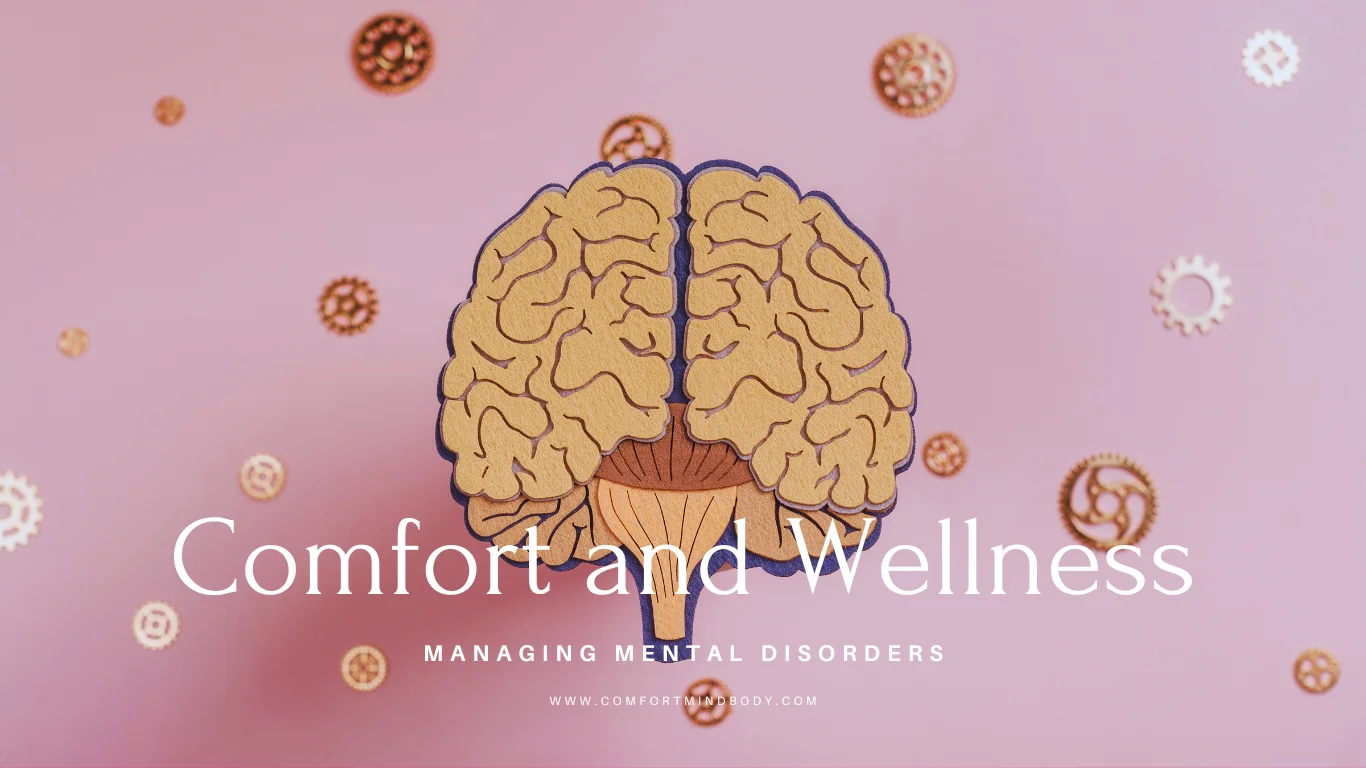Managing Mental Disorders
Understanding mental illness begins with acknowledging that mental health is an integral part of overall health. Just as physical health can be compromised by disease or injury, mental health can be affected by various disorders, collectively referred to as mental illnesses. These conditions can alter a person’s thinking, feelings, behavior, or a combination of all these aspects, leading to distress and a decreased ability to function in daily life.
Mental illness does not discriminate; it affects people of all ages, races, genders, and socioeconomic statuses. It can be caused by a complex interplay of genetic, biological, personality, and environmental factors. Despite the widespread nature of these conditions, they remain misunderstood and stigmatized in many societies. This comprehensive guide aims to shed light on mental disorders and provide useful information for those seeking to understand and manage them.
Just as physical illnesses have varying degrees of severity, mental illnesses also range from mild to severe. They can be episodic, with individuals experiencing periods of wellness and periods of illness, or they can be persistent, lasting for long periods or even a lifetime. Regardless of their duration or intensity, mental illnesses are real, treatable conditions that millions of people worldwide live with every day.
Common Types of Mental Illness
There are many types of mental illness, each with its unique characteristics and symptoms. Among the most common are mood disorders, anxiety disorders, psychotic disorders, eating disorders, and personality disorders.
Mood disorders, such as depression and bipolar disorder, primarily affect a person’s emotional state. Anxiety disorders, including generalized anxiety disorder, panic disorder, and phobias, are characterized by persistent and excessive worry. Psychotic disorders, such as schizophrenia, involve distorted thinking and awareness. Eating disorders, such as anorexia nervosa, bulimia nervosa, and binge-eating disorder, affect a person’s relationship with food and body image. Personality disorders, including borderline personality disorder and antisocial personality disorder, are long-term patterns of thoughts and behaviors that cause serious problems with relationships and work.
These are just a few examples of the common mental disorders that affect people worldwide. It’s important to remember that each person’s experience with mental illness is unique; symptoms can vary widely even within the same diagnosis, and many people live with more than one mental health disorder.
Explaining the Three Major Causes That Contribute to Mental Health Disorders
The causes of mental health disorders are complex and multifaceted. They often result from a combination of genetic, biological, and environmental factors.
Genetic factors can play a significant role in the development of mental disorders. Certain mental illnesses, such as schizophrenia and bipolar disorder, tend to run in families, suggesting a genetic link. However, just because a person has a family member with a mental disorder does not mean they will develop the disorder themselves. This indicates that while genetics can make a person more susceptible to mental illness, other factors are also at play.
Biological factors refer to the physical characteristics of the body that can contribute to mental disorders. These can include brain chemistry, hormone imbalances, and physical injuries or illnesses. For example, an imbalance in neurotransmitters, the brain’s chemical messengers, is thought to play a role in conditions like depression and anxiety disorders.
Environmental factors include a person’s life experiences and external conditions that can affect mental health. These can range from traumatic events such as abuse or warfare to chronic stressors like poverty or discrimination. Such experiences can trigger mental health disorders in people who are already vulnerable due to genetic or biological factors.
With these fruity little CBD gummies. ZERO THC and the perfect way to kickstart your day, you’ll be coming back for more. It’s blended with the best formula for a stress-free, calm mind!
Signs and Symptoms of Mental Illness
Recognizing the signs and symptoms of mental illness can be the first step toward seeking help. While these can vary widely depending on the specific disorder, common signs may include feelings of sadness or hopelessness, extreme mood changes, withdrawal from social activities, difficulty concentrating, changes in sleep and appetite, and thoughts of suicide.
It’s important to note that experiencing one or more of these symptoms does not necessarily mean a person has a mental illness. Many of these signs can also be part of the normal ups and downs of life. However, when these symptoms persist and interfere with a person’s ability to function in daily life, they may indicate a mental health disorder.
Comprehensive List of Mental Illnesses
While it’s beyond the scope of this article to detail every mental illness, some of the most common ones include:
- Mood disorders (e.g., depression, bipolar disorder)
- Anxiety disorders (e.g., generalized anxiety disorder, panic disorder, phobias)
- Psychotic disorders (e.g., schizophrenia)
- Eating disorders (e.g., anorexia nervosa, bulimia nervosa, binge-eating disorder)
- Personality disorders (e.g., borderline personality disorder, antisocial personality disorder)
- Trauma-related disorders (e.g., post-traumatic stress disorder)
- Substance use disorders
Each of these disorders has its own set of symptoms, causes, and treatment options. It’s also important to note that mental illnesses can coexist; it’s not uncommon for a person to have more than one mental health disorder.
Understanding Psychological Disorders
Psychological disorders, also known as mental disorders, encompass a wide range of conditions that affect mood, thinking, and behavior. They can be thought of as patterns of psychological symptoms that cause distress, impair function, or increase the risk of death, pain, or disability.
Understanding these disorders involves recognizing that they are not the result of personal weakness or a character flaw. They are real, complex conditions that require appropriate treatment and management. While the exact cause of most mental disorders is not fully understood, they are thought to result from a complex interplay of genetic, biological, and environmental factors.
Truvaga quickly works with your body to balance your nervous system, creating a deep, natural relaxation response to calm your racing mind. Helping you think more clearly, sleep more soundly and live life more fully.
Exploring Psychiatric Disorders
Psychiatric disorders are a subset of mental disorders that are diagnosed and treated by psychiatrists. These include conditions like schizophrenia, bipolar disorder, major depression, anxiety disorders, and personality disorders.
Treatment for psychiatric disorders often involves a combination of medication and psychotherapy. The exact treatment plan will depend on the specific disorder and individual patient’s needs. It’s important to remember that treatment is effective, and most people with psychiatric disorders improve over time with appropriate care.
Mental Health Diagnosis: How It Works
Diagnosing a mental health disorder involves a thorough evaluation by a mental health professional. This typically includes a clinical assessment, which involves a detailed interview about the person’s symptoms, medical history, and family history of mental health disorders.
In some cases, the mental health professional may also use specific diagnostic tests, such as psychological tests or brain imaging studies. The goal of this process is to rule out other potential causes of symptoms, identify any co-occurring disorders, and develop a comprehensive treatment plan.
Treatment Options for Mental Health Disorders
Treatment for mental health disorders often involves a combination of medication, psychotherapy, and self-care. The exact treatment plan will depend on the specific disorder and the individual’s needs.
Medications can help manage symptoms of mental disorders, such as reducing anxiety, stabilizing mood, or improving sleep. Psychotherapy, also known as talk therapy, can help individuals understand their illness, learn coping strategies, and improve their quality of life. Self-care, including regular exercise, a healthy diet, and adequate sleep, can also play a critical role in managing mental health disorders.
Managing Mental Health Issues: A Guide
Managing mental health issues often involves a combination of professional treatment and self-care. In addition to medications and therapy, it’s important for individuals to take care of their physical health, build supportive relationships, and learn coping strategies to manage stress.
Many people find it helpful to join a support group, where they can connect with others who are facing similar challenges. It’s also beneficial to educate oneself about one’s illness, as this can help reduce fear and stigma and promote understanding and self-advocacy.
Anxiety is a normal human reaction to stress. It is the body’s natural defense mechanism, preparing us to face or flee from danger. However, when anxiety becomes excessive or out of proportion to the situation, it can interfere with daily activities and become a mental health disorder.
Conclusion: Breaking the Stigma Around Mental Illness
In conclusion, mental illness is a complex, multifaceted issue that affects millions of people worldwide. Despite the challenges it presents, it is important to remember that mental illness is treatable, and there is hope for recovery.
Breaking the stigma around mental illness starts with education and understanding. It’s about recognizing that mental disorders are not a sign of weakness or a character flaw, but rather real, biologically-based conditions that require appropriate treatment and care.
By sharing knowledge, promoting understanding, and fostering empathy, we can help create a world in which mental illness is treated with the same respect and understanding as physical illness.
Affiliate Disclosure:
The links contained in this product review may result in a small commission. This goes towards supporting our research and editorial team and please know we only recommend high-quality products.
Note: This article is for informational purposes only and is not intended to diagnose, treat, or cure any disease. Always consult a healthcare professional before taking any supplement or making any changes to your diet or lifestyle.








